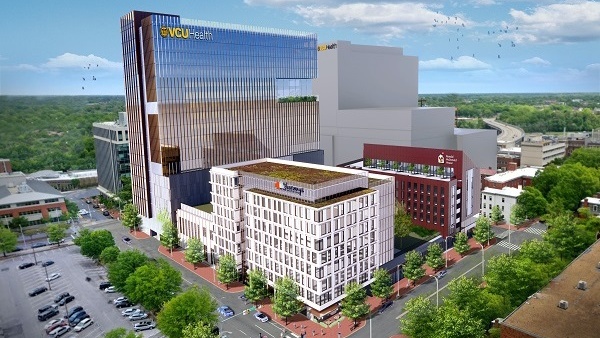
A rendering of the VCU Health-anchored office tower and complex that would have replaced the Public Safety Building. (BizSense file)
VCU administrators have called it “an anomaly.” Gov. Glenn Youngkin declared it “a wake-up call.” Former governor Doug Wilder decried it as “financial misbehavior.”
The events that led up to what’s become known as “The lease that will go down in history” were years in the making, but it was over the course of 2023 that VCU Health System’s controversial and costly downtown development deal was revealed and unraveled.
The ill-fated redevelopment of the Public Safety Building site that the health system had signed on to anchor as a master tenant had been stalled for months by the time the City of Richmond took back the property in early February, signaling the demise of the $325 million project that spawned from the failed Navy Hill plan.
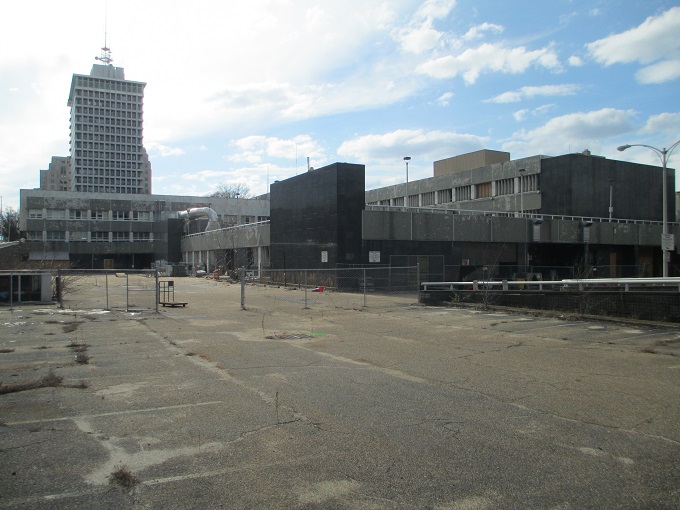
The Public Safety Building site at Leigh and 10th streets, a block away from City Hall. (BizSense file photos)
At the time, VCU Health said only that it remained committed to developing the long-coveted site with a pricier project to include a new home for Virginia Commonwealth University’s School of Dentistry. It did not say why the stalled project had failed, or why the health system had pulled out of it.
It also didn’t voluntarily say at the time what reporting from Richmond BizSense would reveal months later: that VCU Health had to pay $73 million to back out of the deal. The exit payment was only disclosed in response to Freedom of Information Act requests from BizSense, which broke the news in May.
Calls for an investigation were promptly made by Wilder, the former Virginia governor and Richmond mayor who’s now a professor and namesake of VCU’s L. Douglas Wilder School of Government and Public Affairs. A vocal critic of VCU President Michael Rao, Wilder also called for Rao to be fired by the university’s Board of Visitors.
Rao and other officials maintained that the health system decided to exit the project – a multi-building complex that would have included a high-rise office tower for VCU Health – in light of challenges arising over the course of the pandemic and the financial obligations that came with the deal, including $617 million in rent over the 25-year lease.
Additional FOIA requests revealed, however, that the health system’s financial obligations extended well beyond the terms of its lease.
The deal it signed with the development group led by Oak Street Real Estate Capital, a Chicago investment firm that’s now part of New York-based Blue Owl Capital, put VCU Health on the hook for any project cost overruns, as well as real estate tax payments to the city that continue to be made.
In backing out of the project, it also agreed to handle and pay for the demolition of the Public Safety Building, at a projected cost of $5 million. Work on that effort got underway in recent months.
But it was the $73 million exit payment and the circumstances that led to it that have drawn the most criticism, including from Youngkin and members of Virginia’s congressional delegation such as U.S. Sens. Tim Kaine and Mark Warner and Rep. Bobby Scott.
Email correspondence and other documents obtained through FOIA revealed disharmony between VCU Health, the City of Richmond and Capital City Partners, the same development team that was behind Navy Hill under a different name.
The documents also showed a reluctance from VCU Health to go forward with the project, including from then-CEO Art Kellermann, who fought for Rao and others to reconsider the deal before ultimately signing off on it at the urging of university leadership.
Three months later, the developers informed the health system that the original project couldn’t be built, citing challenges with the site that were driving up costs and increases in construction costs fueled by the pandemic and inflation. A scaled-down version of the project was offered, but ultimately the project could not be saved as talks turned to how to get out of it – leading to the $73 million payment.
Around that time, Kellermann was out, resigning at Rao’s request for undisclosed reasons.
That an exit payment was even needed has been questioned by local observers familiar with the VCU Health deal or other development deals like it. They also question why, as the exit agreement revealed, the amount of the loan that the financial backers secured to fund the project was $100 million more than the development’s projected cost.
A third-party review commissioned by VCU and VCU Health found that “insufficient due diligence,” turnover in management and “inadequate in-house real estate expertise” were contributing factors to the health system’s costly exit. A subsequent report from a healthcare consulting firm, also commissioned by the health system and university boards, recommended changes to VCU Health’s governance structure.
Much about the saga remains unknown but could be further revealed next year. The Joint Legislative Audit & Review Commission, the oversight agency of the Virginia General Assembly, has committed to conducting and completing its own study of the issue in 2024.
Questions remain about what will happen with the site, and whether the state will support – financially or politically – VCU building its dentistry project there. The JLARC study could help answer that question and others.

A rendering of the VCU Health-anchored office tower and complex that would have replaced the Public Safety Building. (BizSense file)
VCU administrators have called it “an anomaly.” Gov. Glenn Youngkin declared it “a wake-up call.” Former governor Doug Wilder decried it as “financial misbehavior.”
The events that led up to what’s become known as “The lease that will go down in history” were years in the making, but it was over the course of 2023 that VCU Health System’s controversial and costly downtown development deal was revealed and unraveled.
The ill-fated redevelopment of the Public Safety Building site that the health system had signed on to anchor as a master tenant had been stalled for months by the time the City of Richmond took back the property in early February, signaling the demise of the $325 million project that spawned from the failed Navy Hill plan.

The Public Safety Building site at Leigh and 10th streets, a block away from City Hall. (BizSense file photos)
At the time, VCU Health said only that it remained committed to developing the long-coveted site with a pricier project to include a new home for Virginia Commonwealth University’s School of Dentistry. It did not say why the stalled project had failed, or why the health system had pulled out of it.
It also didn’t voluntarily say at the time what reporting from Richmond BizSense would reveal months later: that VCU Health had to pay $73 million to back out of the deal. The exit payment was only disclosed in response to Freedom of Information Act requests from BizSense, which broke the news in May.
Calls for an investigation were promptly made by Wilder, the former Virginia governor and Richmond mayor who’s now a professor and namesake of VCU’s L. Douglas Wilder School of Government and Public Affairs. A vocal critic of VCU President Michael Rao, Wilder also called for Rao to be fired by the university’s Board of Visitors.
Rao and other officials maintained that the health system decided to exit the project – a multi-building complex that would have included a high-rise office tower for VCU Health – in light of challenges arising over the course of the pandemic and the financial obligations that came with the deal, including $617 million in rent over the 25-year lease.
Additional FOIA requests revealed, however, that the health system’s financial obligations extended well beyond the terms of its lease.
The deal it signed with the development group led by Oak Street Real Estate Capital, a Chicago investment firm that’s now part of New York-based Blue Owl Capital, put VCU Health on the hook for any project cost overruns, as well as real estate tax payments to the city that continue to be made.
In backing out of the project, it also agreed to handle and pay for the demolition of the Public Safety Building, at a projected cost of $5 million. Work on that effort got underway in recent months.
But it was the $73 million exit payment and the circumstances that led to it that have drawn the most criticism, including from Youngkin and members of Virginia’s congressional delegation such as U.S. Sens. Tim Kaine and Mark Warner and Rep. Bobby Scott.
Email correspondence and other documents obtained through FOIA revealed disharmony between VCU Health, the City of Richmond and Capital City Partners, the same development team that was behind Navy Hill under a different name.
The documents also showed a reluctance from VCU Health to go forward with the project, including from then-CEO Art Kellermann, who fought for Rao and others to reconsider the deal before ultimately signing off on it at the urging of university leadership.
Three months later, the developers informed the health system that the original project couldn’t be built, citing challenges with the site that were driving up costs and increases in construction costs fueled by the pandemic and inflation. A scaled-down version of the project was offered, but ultimately the project could not be saved as talks turned to how to get out of it – leading to the $73 million payment.
Around that time, Kellermann was out, resigning at Rao’s request for undisclosed reasons.
That an exit payment was even needed has been questioned by local observers familiar with the VCU Health deal or other development deals like it. They also question why, as the exit agreement revealed, the amount of the loan that the financial backers secured to fund the project was $100 million more than the development’s projected cost.
A third-party review commissioned by VCU and VCU Health found that “insufficient due diligence,” turnover in management and “inadequate in-house real estate expertise” were contributing factors to the health system’s costly exit. A subsequent report from a healthcare consulting firm, also commissioned by the health system and university boards, recommended changes to VCU Health’s governance structure.
Much about the saga remains unknown but could be further revealed next year. The Joint Legislative Audit & Review Commission, the oversight agency of the Virginia General Assembly, has committed to conducting and completing its own study of the issue in 2024.
Questions remain about what will happen with the site, and whether the state will support – financially or politically – VCU building its dentistry project there. The JLARC study could help answer that question and others.

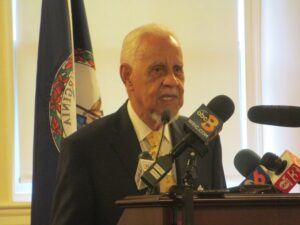
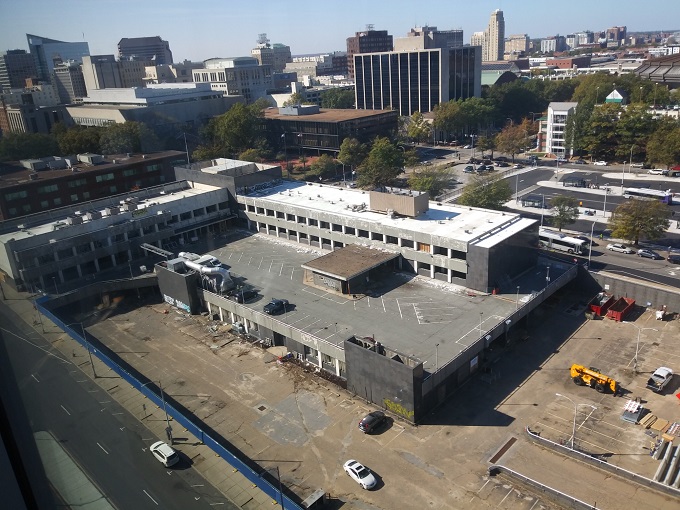
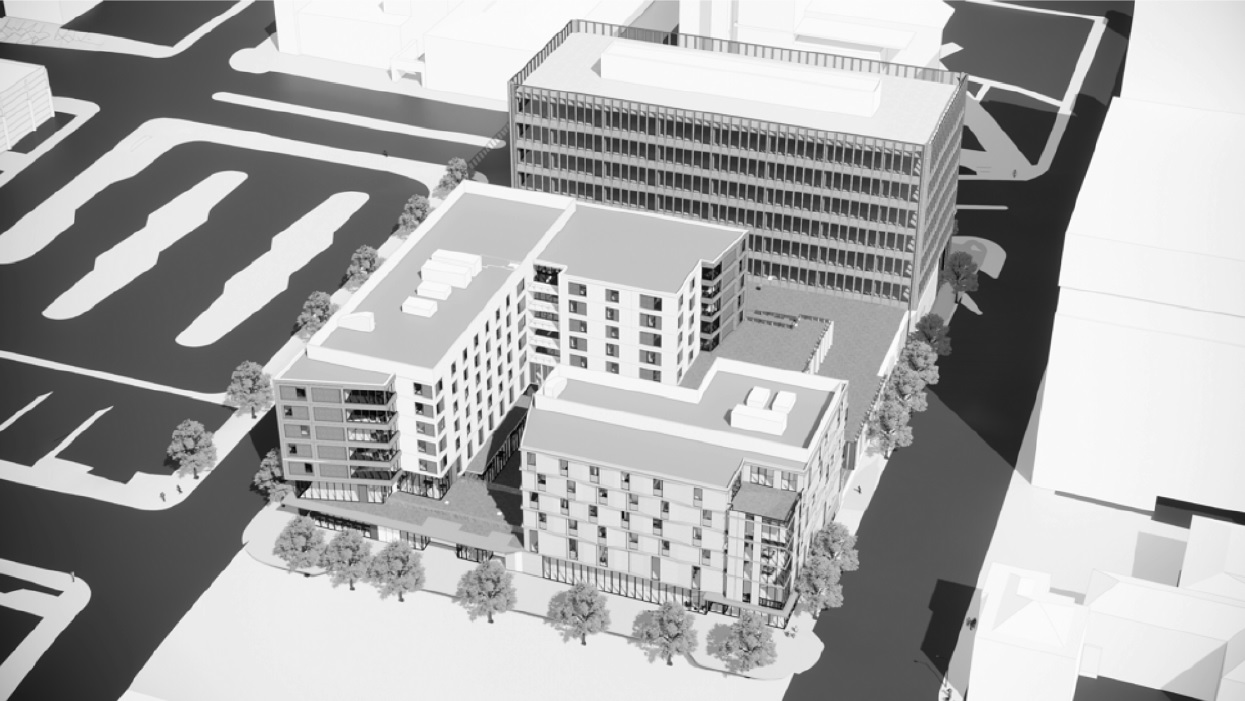
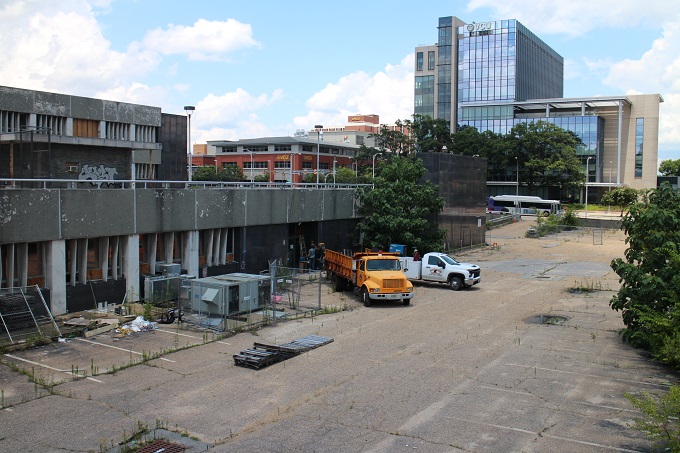


Story of the year without question.